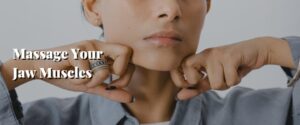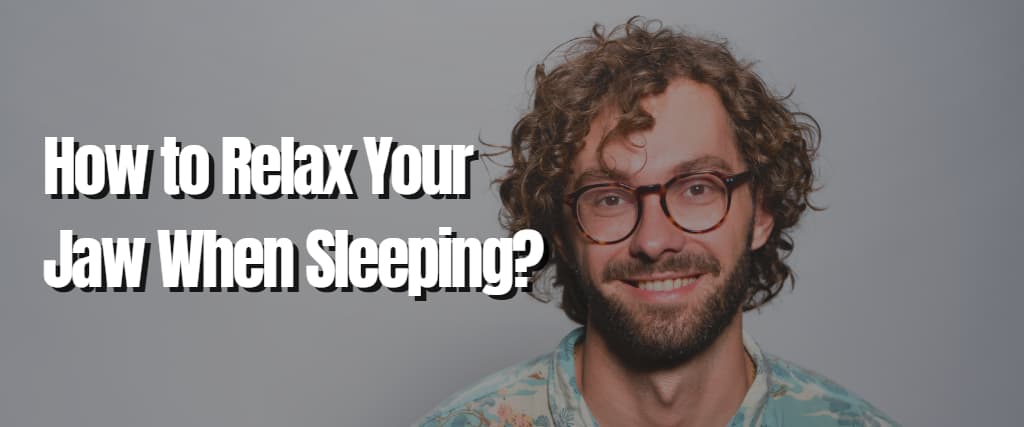Have you ever experienced a splitting headache or sore facial muscles when you first woke up? If you answered “yes,” you might unknowingly clench your jaw as you sleep.
If your jaw is clenched, you can have discomfort or soreness in the ears, face, or head and the degree of pain vary; it’s frequently referred to as achy, intense, or painful.
Yawning or chewing makes the ache worse and you could also have trouble widely opening your mouth; your jaw joint may lock, or the jaw may occasionally click.
There are different causes of clenched jaws, which we will discuss in this post. In addition, we will show you how you can loosen your jaw.
7 Reasons for a Tight Jaw
Your jaw may tighten when you are awake or asleep for various reasons — let’s check out some of these reasons below: 
1. Temporomandibular Joint Disorders (TMD)
The TMJ (temporomandibular joint) disorders affect the surrounding jaw muscles and the joint connecting the lower jaw to the skull. In other words, the TMJ joint provides the movement you need to yawn, chew food, and talk.
Disorder of the temporomandibular joint may result from:
- Physical injuries
- Teeth grinding or clenching
- Inflammation caused by autoimmune illnesses or some infections
TMJ disorder symptoms may vary from one patient to another depending on the underlying reason and the severity of the disorder. Among the most typical signs are:
- Discomfort or tenderness in or around the jaw, neck, face, and ear
- Discomfort when chewing or opening jaw
- If you move your jaw, it can snap or click
- Chronic headaches

2. Anxiety and Stress
Anxiety and stress are frequent causes of jaw clenching and muscular strain. While under stress, you could unintentionally clench or grind your teeth, and over time, this could result in tight muscles.
Other indications that you’re stressed out include clenching your fists and having tight shoulders and neck muscles.
If stress and anxiety negatively affect your quality of life, you should speak with a mental health expert, such as a psychologist or psychotherapist. They can assist you in identifying the source of your stress and anxiety and provide you with the proper therapy.
3. Teeth Clenching or Grinding (Bruxism)
“Bruxism” refers to unconscious teeth clenching or grinding, which can occur when you are awake or asleep. Anger, stress, sadness, tension, worry, sleep disorders like sleep apnea, or dental issues like misaligned teeth are just a few of the causes of bruxism.
The most typical signs of bruxism include:
- Experiencing headache, jaw discomfort, or stiff face muscles when you awaken
- Clicking or popping in the jaw joint
- Sensitive teeth to hot or cold meals or beverages
Bruxism can, in extreme circumstances, shatter teeth.
4. Rheumatoid Arthritis (RA)
All muscles and joints in the human body, such as the joints in the jaw, can be impacted by rheumatoid arthritis, a chronic auto-immune condition.
The temporomandibular joint and the tissues surrounding it may be injured if you have TMJ inflammation, which can cause discomfort and trouble opening your mouth. In extreme situations, this inflammation can even result in jaw bone loss.
Rheumatoid arthritis also causes fever, tight jaw, joint inflammation, discomfort, and stiffness.
5. Osteoarthritis (OA)
The jaw joint may have osteoarthritis in a few circumstances. Due to OA, the jaw tissue, cartilage, and bone may deteriorate and lose function. A person with this condition frequently has radiating pain around the TMJ.
6. Tetanus
Clostridium tetani cause tetanus infection, and individuals may have difficulty opening their mouths or swallowing when tetanus infection is severe. Tetanus infections may be avoided, though, thanks to immunisations.
7. Excessive chewing
An individual can experience pain, discomfort, and stiffness in the jaw joint and the muscle surrounding it as with any other muscle and joint in the human body due to overusing the mouth.
Therefore, you should avoid chewing gum and other food that requires prolonged chewing since they can cause overuse injuries to the jaw muscles that can even extend to the neck. TMJ problems can also be a result of excessive chewing.
When to Look for Medical Help?
You might wonder when it would be appropriate to seek medical advice for your stiff jaw. So, if you exhibit any of these signs, you should seek medical attention right away:
- Acute discomfort that becomes worse as you move or eat, especially in the jaw and surrounding region
- Swallowing or opening your mouth with difficulty
- Severe headaches that make it difficult to carry out daily tasks

How to Stop Jaw Clenching?
Here are some suggestions to help you manage a tight jaw.
-
Jaw Exercises
Facial exercises and jaw joint stretching can be beneficial to relieve jaw tension and increase range of motion. Let’s check out your abilities.
- Stretch the TMJ. By placing the tongue tip below the top front teeth, you may try to relax your jaw and cause the top teeth to be further spaced away from the bottom. This is effective for loosening jaw and neck muscles.
- Manual opening of the jaw. Opening and closing your mouth a few times will help you warm up. Then place your fingers on the top of the four front lower teeth and slowly press down until you experience jaw discomfort.
- Smile stretch. Try to smile broadly and watch for any tightness or pain. Then, slowly open your lips for about five centimetres, take a deep breath, and then exhale while simultaneously letting go of your grin.

-
Massage Your Jaw Muscles
A massage will improve blood flow to your jaw muscles and reduce rigidity. Therefore, with your mouth wide open, gently touch the muscles close to your ears — where the TMJ is — by moving in a circular motion. Do this before bed many times each day.
-
Consider Using a Mouth Guard
The first line of defence against teeth clenching or jaw grinding is mouth guards, commonly referred to as dental splints or night guards. A mouth guard is one of the most effective methods for loosening a tight jaw. It aids in avoiding joint and muscle discomfort in the jaw.
The night protectors specially created to fit you are the cosiest and most practical choice. To get the most incredible night guard for your mouth, you must go to the dentist if you decide to wear one.
-
Medications
Medical specialists advise patients to use muscle relaxants, botox injections, or anti-stress or anti-anxiety drugs to assist their jaw muscles in relaxing when sleeping. These drugs function by lowering the activity of the facial muscles.
However, their efficacy has not yet been verified scientifically, and there may be some unfavourable side effects. Therefore, use the medicine only as a last resort after exhausting all other, less intrusive options. Always use medication under the guidance of a healthcare expert.
-
Other Jaw Relaxing Options
You might attempt the following extra methods to relax your jaw while you’re sleeping:
- Apply a compress to your jaw muscles, either cold or hot
- Consider performing some neck and head stretches
- Consider acupressure or acupuncture
- Using a laser shortwave diathermy therapy, relax your jaw;
- Use yoga, deep breathing exercises, meditation, or cardiovascular workouts like swimming, dancing, or walking to lower stress and anxiety levels.
Concluding Thoughts
While having a tight jaw may not necessarily harm your health, it may be unpleasant and uncomfortable, so identifying the root of the problem is essential if you wish to relax your jaw.
The post has listed seven potential causes of a tight jaw so you can determine if they apply to you. Finding the appropriate therapy is the next step; thus, speaking with a medical expert who can assist you with this illness is advisable.





